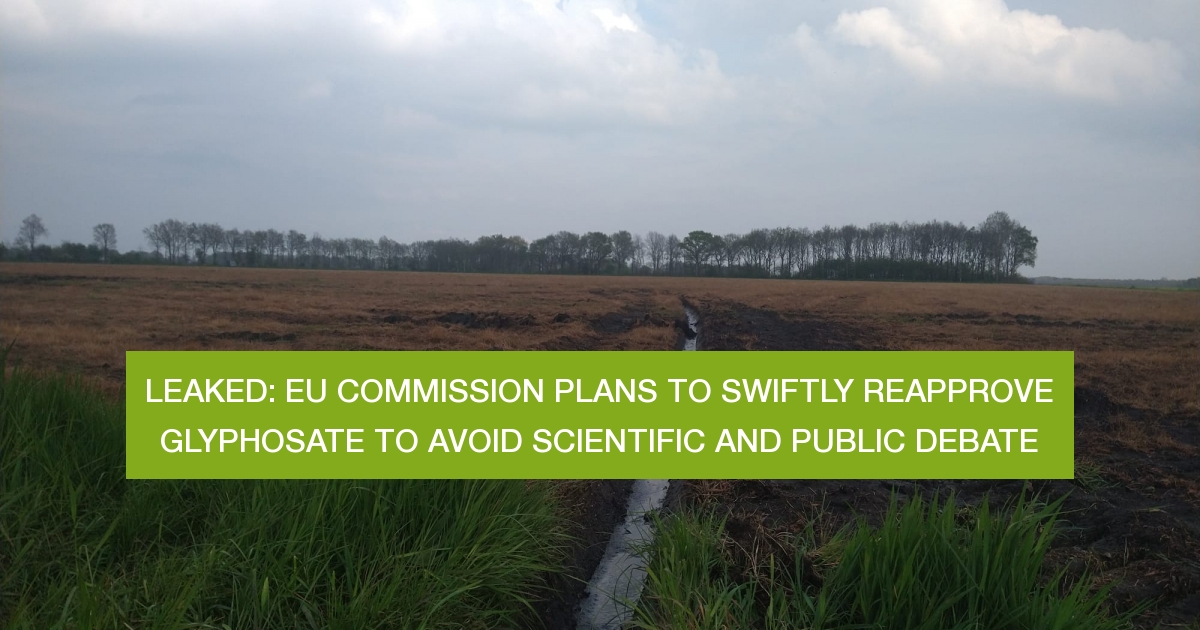The European Commission has acted behind closed doors and already presented a draft glyphosate renewal report[1] to Member States, according to a leaked document received by PAN Europe. A proposal for reapproval of glyphosate's license is now expected in September despite all the toxicity issues raised by the European Food Safety Authority (EFSA). Paradoxically, EFSA will publish the background documents that led to its conclusions only in October. In an attempt to avoid scientific and public scrutiny of EFSA's work, DG Sante is speeding up the decision-making procedure in secrecy with Member States.
In the Standing Committee on Plant, Animals, Food and Feed (SCoPAFF) from 11 and 12 July, DG Sante presented to Member States its draft Renewal Report for glyphosate. The European Commission intends to re-approve the substance without restrictions, disregarding the fact many provisions of the law and case law on health and environmental protection are not met.
Angeliki Lyssimachou, Head of Science and Policy at PAN Europe said: “DG Sante is turning a blind eye to the toxicity issues and data gaps identified by EFSA in relation to glyphosate use and is secretly trying to quickly reissue its license by evading any public scrutiny. It is simply outrageous to witness the Commission undermining democratic rules and transparency in favour of granting a license to such a harmful pesticide.”
The presentation of the Commission Renewal Report was not announced in the agenda[2] of the SCoPAFF meeting from July and is not part of the documents from the Comitology Transparency Register[3]. According to the agenda, there was supposed to be only an 'exchange of view' on the EFSA conclusions.
Martin Dermine, PAN Europe's Executive Director added: “During the risk assessment of glyphosate, EFSA identified a series of toxicity issues that should prevent the reapproval of the substance, according to the pesticide regulation. EFSA however will publish its complete Peer Review only at the end of July, and the supporting documents only by October. Hence, it won’t be until October that scientists and civil society will have the chance to scrutinise EFSA's work. DG Sante hastily moves forward in secrecy while leaving civil society in the dark, just before the summer recess. How transparent and democratic is this?”
On 6 July, the EFSA published a summary of the main findings of its conclusions on the peer review of the risk assessment of glyphosate[4]. EFSA indicated that they found no 'Critical Areas of Concerns', meaning that no major toxicity findings would prevent the reapproval of the substance. To our concern, however, the Authority indicated that the risk assessment could not be finalised for a series of major endpoints, while it acknowledged there is evidence linking the use of the herbicide to neurotoxicity, damage to the microbiome and harm biodiversity. PAN Europe wrote a letter[5] to EFSA's executive director to denounce the fact that they artificially kept the list of Critical Areas of Concerns empty, and thus presented major risks for human health and the environment as acceptable, while not acting within the boundaries of the law and the case law.
Angeliki Lyssimachou said: “Hundreds of independent scientific publications demonstrate that glyphosate use threatens biodiversity, while others indicate that it is neurotoxic, causes DNA toxicity and is linked to cancer. By proposing a re-approval of the substance, DG Sante is failing to implement EU law, leaving citizens and the environment unprotected.”
Martin Dermine concluded: “DG Sante evidently refuses to take responsibility to protect citizens and the environment against the toxicity of glyphosate use. Instead, it tries to transfer the burden to Member States who should now manage the embarrassing EFSA findings on the toxicity of the herbicide, in complete opposition with EU law and the objectives of the EU Green Deal!”
Contacts:
- Dr Angeliki Lysimachou, Head of Science and Policy, +32 496 39 29 30, angeliki [at] pan-europe.info
- Dr Martin Dermine Executive Director, +32 486 32 99 92, martin [at] pan-europe.info
Notes:
[1] https://www.pan-europe.info/sites/pan-europe.info/files/public/resources...
[2] https://food.ec.europa.eu/horizontal-topics/committees/paff-committees/p...
[3] https://ec.europa.eu/transparency/comitology-register/screen/meetings/CM...
[4] https://www.efsa.europa.eu/en/factsheets/efsa-explains-scientific-assess...

